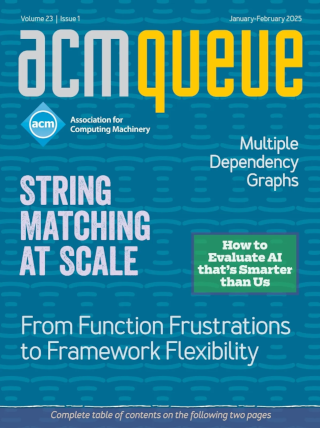
Convergence:
Research for Practice reboot
It is with great pride and no small amount of excitement that I announce the reboot of acmqueue's Research for Practice column. For three years, beginning at its inception in 2016, Research for Practice brought both seminal and cutting-edge research - via careful curation by experts in academia - within easy reach for practitioners who are too busy building things to manage the deluge of scholarly publications. We believe the series succeeded in its stated goal of sharing "the joy and utility of reading computer science research" between academics and their counterparts in industry. We know our readers have missed it, and we are delighted to rekindle the flame after a three-year hiatus. For this first installment, we invited Dr. Martin Kleppmann, research fellow and affiliated lecturer at the University of Cambridge, to curate a selection of recent research papers in a perennially interesting domain: convergent or "eventual consistent" replicated systems. His expert analysis circles the topic, viewing it through the lens of recent work in four distinct research domains: systems, programming languages, human-computer interaction, and data management. Along the way, readers will be exposed to a variety of data structures, algorithms, proof techniques, and programming models (each described in terms of a distinct formalism), all of which attempt to make programming large-scale distributed systems easier. I hope you enjoy his column as much as I did.
The Challenges of IoT, TLS, and Random Number Generators in the Real World:
Bad random numbers are still with us and are proliferating in modern systems.
Many in the cryptographic community scoff at the mistakes made in implementing RNGs. Many cryptographers and members of the IETF resist the call to make TLS more resilient to this class of failures. This article discusses the history, current state, and fragility of the TLS protocol, and it closes with an example of how to improve the protocol. The goal is not to suggest a solution but to start a dialog to make TLS more resilient by proving that the security of TLS without the assumption of perfect random numbers is possible.
I'm Probably Less Deterministic Than I Used to Be:
Embracing randomness is necessary in cloud environments.
In my youth, I thought the universe was ruled by cause and effect like a big clock. In this light, computing made sense. Now I see that both life and computing can be a crapshoot, and that has given me a new peace.
Securing the Company Jewels:
GitHub and runbook security
Often the problem with a runbook isn't the runbook itself, it's the runner of the runbook that matters. A runbook, or a checklist, is supposed to be an aid to memory and not a replacement for careful and independent thought. But our industry being what it is, we now see people take these things to their illogical extremes, and I think this is the problem you are running into with your local runbook runner.
Privacy of Personal Information:
Going incog in a goldfish bowl
Each online interaction with an external service creates data about the user that is digitally recorded and stored. These external services may be credit card transactions, medical consultations, census data collection, voter registration, etc. Although the data is ostensibly collected to provide citizens with better services, the privacy of the individual is inevitably put at risk. With the growing reach of the Internet and the volume of data being generated, data protection and, specifically, preserving the privacy of individuals, have become particularly important. In this article we discuss the data privacy concepts using two fictitious characters, Swara and Betaal, and their interactions with a fictitious entity, namely Asha Hospital.



